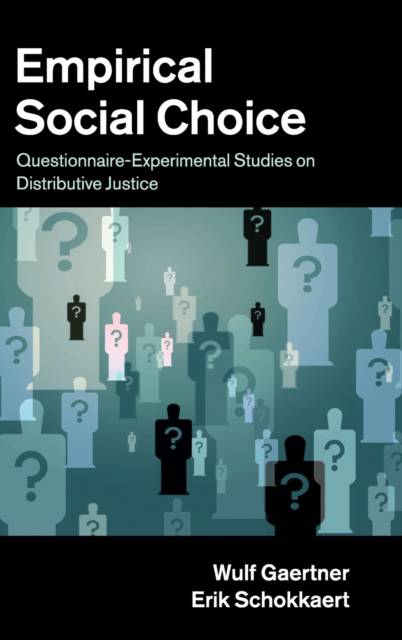
Door een staking bij bpost kan je online bestelling op dit moment iets langer onderweg zijn dan voorzien. Dringend iets nodig? Onze winkels ontvangen jou met open armen!
- Afhalen na 1 uur in een winkel met voorraad
- Gratis thuislevering in België vanaf € 30
- Ruim aanbod met 7 miljoen producten
Door een staking bij bpost kan je online bestelling op dit moment iets langer onderweg zijn dan voorzien. Dringend iets nodig? Onze winkels ontvangen jou met open armen!
- Afhalen na 1 uur in een winkel met voorraad
- Gratis thuislevering in België vanaf € 30
- Ruim aanbod met 7 miljoen producten
Zoeken
Empirical Social Choice
Questionnaire-Experimental Studies on Distributive Justice
Wulf Gaertner, Erik Schokkaert
Hardcover | Engels
€ 106,95
+ 213 punten
Omschrijving
Since Aristotle, many different theories of distributive justice have been proposed, by philosophers as well as social scientists. The typical approach within social choice theory is to assess these theories in an axiomatic way - most of the time the reader is confronted with abstract reasoning and logical deductions. This book shows that empirical insights are necessary if one wants to apply any theory of justice in the real world. It does so by confronting the main theories of distributive justice with data from (mostly) questionnaire experiments. The book starts with an extensive discussion on why empirical social choice makes sense and how it should be done. It then presents various experimental results relating to theories of distributive justice, including the Rawlsian equity axiom, Harsanyi's version of utilitarianism, utilitarianism with a floor, responsibility-sensitive egalitarianism, the claims problem and fairness in health.
Specificaties
Betrokkenen
- Auteur(s):
- Uitgeverij:
Inhoud
- Aantal bladzijden:
- 228
- Taal:
- Engels
Eigenschappen
- Productcode (EAN):
- 9781107013940
- Verschijningsdatum:
- 9/04/2012
- Uitvoering:
- Hardcover
- Formaat:
- Ongenaaid / garenloos gebonden
- Afmetingen:
- 152 mm x 229 mm
- Gewicht:
- 476 g

Alleen bij Standaard Boekhandel
+ 213 punten op je klantenkaart van Standaard Boekhandel
Beoordelingen
We publiceren alleen reviews die voldoen aan de voorwaarden voor reviews. Bekijk onze voorwaarden voor reviews.











